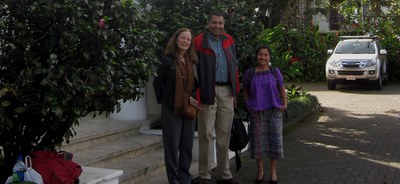FCMC Participates in Natural Resource Governance Framework Scoping Workshop in Central America, December 2013

Poor natural resource governance has been an enduring challenge for decades, and improving governance is essential to control the drivers of deforestation and forest degradation for successful mitigation and adaptation to climate change. To address this problem, the NRGF initiative of IUCN and its Commission on Environmental, Economic and Social Policy (CEESP) and World Commission on Environmental Law are developing a robust, credible process for assessing the strengths and weaknesses of natural resource governance, and supporting improved decision-making and accountabilities in the planning and implementation of policies, programs and projects that affect natural resources.
To begin the daylong scoping workshop in San Jose, the NRGF initiative was presented by NRGF Working Group leaders Dr. Alcorn, Juanita Cabrera-Lopez, and Adalberto Padilla (pictured above). The ORMA office senior team next summarized their activities and lessons learned relevant to the NRGF, noting that 90 percent of their work is done with Indigenous Peoples due to the significant overlap between biodiversity and Indigenous Peoples in Mexico and the Central America region. The group analyzed governance threats in the region and opportunities for addressing these threats. REDD+ was seen as continuing to be a very important platform in all countries because it stimulates valuable policy reforms. The European Union’s Forest Law, Enforcement, Governance and Tradt (FLEGT) Facility is also of interest for reforms in Guatemala and Honduras.
The scoping workshop participants then prioritized NRGF regional initiative activities for 2014, including preparations for the Mesoamerican Parks Congress to be held in March in Costa Rica, and synergies with other ongoing activities, including: the newly released ORMA policy and arrangements for working with Indigenous Peoples; development of Free, Prior and Informed Consent (FPIC) in relation to work with Indigenous Peoples in the region; and scoping opportunities linked to ongoing case studies of the impacts of extractive industry and major infrastructure developments on environment, protected areas, and indigenous communities. Further NRGF scoping with IUCN members, civil society organizations and indigenous leaders were also planned for the first quarter of next year, leading up to the Mesoamerica Parks Congress in March. The NRGF work in Mesoamerica will also contribute to NRGF presentations at the World Parks Congress in Australia (November 2014).

